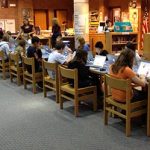Research completed in the Neag School of Education by Dr. Todd Campbell, Associate Professor in Science Education, is contributing to what we know about supporting teachers with professional development, curriculum, and technology focused on engaging students in investigative science learning. Through National Science Foundation Discovery Research K-12 funding Dr. Campbell and his team of colleagues from Utah State University, Boise State University, and the New York Institute of Technology developed and used innovative curriculum units that have been used extensively in New York and Utah by more than 90 teachers and 9000 students over the past 5 years. More about this curriculum and technologies, like 3-D virtual ecological environments and online virtual world games, can be found in practitioner journals like Science Scope and Science Activities: Classroom Projects and Curriculum Ideas. Research included in the International Journal of Science Education as part of this work has demonstrated how teachers ideas and beliefs about science teaching have shifted overtime to images of science more commensurate with the actual work of scientists. Additionally, research presented at the Association of Science Teacher Education 2014 International Conference has demonstrated how students in teachers’ classrooms participating in the project achieve significantly higher on state-level standardized assessments than students of teachers from a control group who are not participating in the project. Finally, evidence from this research also demonstrates how teachers’ classroom instruction has changed to include more technology for supporting students’ science investigations. More about this project and project resources can be found at http://cyberlearning.uconn.edu/
Campbell, T., ZuWallack, B. A., Longhurst, M., Shelton, B. E., & Wolf, P. G. (2014). An examination of the changes in science teaching orientations and technology-enhanced tools for student learning in the context of professional Development. International Journal of Science Education. 36(11), 1815-1848. First published online 21 January 2013. DOI 10.1080/09500693.2013.879622.
Campbell. T., Longhurst, M., Wang, S., Hsu, H., & Coster, D. (2014). New technologies and reformed-based science instruction: An examination of the professional development focused on supporting science teaching and learning with technologies. Presentation at the 2014 Association for Science Teacher Education (ASTE) International Convention. San Antonio, Texas.
Campbell, T., Dowdle, G., Shelton, B. E., Olsen, J., Longhurst, M., & Beckett, H. (2013). Gaming as a platform for developing science practices. Science Activities: Classroom Projects and Curriculum Ideas, 50(3), 90-98.
Duffy, A. M., Wolf, P. G., Barrow, J., Longhurst, M., & Campbell, T. (2013). Ecological investigations within an interactive plant community simulation. Science Scope. 36(8), 42-51.
Campbell, T., Longhurst, M., Duffy, A. M., Wolf, P. G., & Nagy, R. (2012). Investigating human impact in the environment with faded scaffolded inquiry supported by technologies. Science Activities: Classroom Projects and Curriculum Ideas, 49:4, 99-107.
